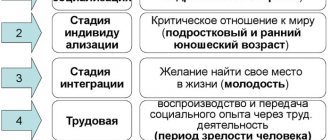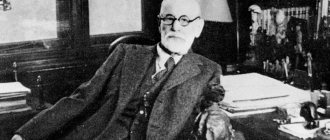Negative qualities of a person contain, oddly enough, positive tendencies, which are their basis, root, and if these positive tendencies are developed, this leads to a harmonious and happy life.
Man is basically good, and any bad character traits he has are not his true nature. In other words, the initial positive aspirations and inclinations of a person, under the influence of various circumstances of the material world (environment), can be distorted, transforming over time into negative qualities. And this transformation, of course, is reversible.
We can say that various negative tendencies of a person (for example, drinking, smoking, gossiping, bragging, etc.) are a kind of substitutes for the good qualities that the person previously had.
In this article we will look at some negative character traits along with the positive tendencies they contain, which will allow us to analyze ourselves (and others), identify our good tendencies and aspirations, and then develop them, and thus improve our lives.
Any negative trend listed below is an incorrect use of soul energy, which, naturally, causes no less negative consequences. However, there is no need to fight bad qualities, they do not need to be suppressed, you just need to change the direction of your efforts. You can’t just stop the flow of energy, but it can be redirected where we need it. This is similar to how it is impossible to stop a river, no matter what dam we build, but we can turn the river into another channel that we need. Often a person tries to fight negative character traits by suppressing them, and for a while this may work, but then the dam breaks, which brings even more destruction. Therefore, there is only one reasonable solution - to transform the energy, change the vector of movement, and this article will help you understand how to do this.
Definition
Inclination in psychology is a concept that explains a person’s orientation towards a particular activity. The definition is closely related to a set of personality properties - abilities.
An ability is a characteristic of a person whose traits relate to the condition for successfully performing a specific task. It develops thanks to the initial inclinations in the process of work, to a greater extent - educational. Does not correlate with existing properties: knowledge, skills or abilities.
Question about the understanding of the term
S. Rubinstein interprets the concept as a professional orientation, while A. Kovalev talks about the need for a certain type of activity. Personal psychology specialist K. Platonov identifies the concept as one of the many manifestations of a social orientation.
A. Orlov believes that inclination is a term that does not indicate any work, but only the one by which a person is motivated. That is, in the case when pleasure is brought not only by achieving the goal, but also by its very implementation.
The set of patterns responsible for abilities are determined due to the depth, simplicity, and stability of mastering the techniques and skills of a certain type of activity. All of them belong to the primary regulators within the psyche, and they differ in the possibility of acquisition and development.
Inclination in psychology is a concept that, along with abilities, resources and inclinations, are included in a specific area of mental phenomena of an individual, which in turn is associated with the provision and development of any kind of activity.
Often, the propensity for a particular action or skill is directly related to the presence of abilities, but there have been examples of discrepancies in psychiatric practice.
Thus, depending on the strength of a child’s involvement in a certain type of work, his abilities for this activity develop to a greater extent. In this case, the inclination is supported, first of all, by the success of completing the task.
How to transform your qualities
The secret of transformation is very simple: you need to communicate more with people who have the qualities that you lack. In other words, have more contact with those who have strong positive tendencies. It’s not for nothing that they say “whoever you get along with, you’ll gain from”: under the influence of a positive environment, our own negative qualities are transformed into the original positive ones. In addition, we should try to avoid communicating with people who display negative qualities, as this has the opposite effect - we become infected with negativity and adopt a bad character.
What should we do if we don’t have the right people in our environment, but we don’t want to look for them, we don’t have time, we’re afraid, embarrassed, etc.? There is a way out - you need to listen to their lectures, watch their videos, read their books or attend their seminars. Of course, live communication is preferable, but if it is not there, then the listed options will also do. The transformation of qualities occurs in those moments when we come into contact with the corresponding qualities of another person or people, regardless of whether we are aware of it or even have no idea what is happening and how. Simply by communicating more in the company of good people, we begin to notice how our internal transformation occurs, how positive tendencies are revived in our hearts, how our character changes. In addition, we begin to understand the higher goal and move towards it.
More details about qualities and trends can be heard in the lectures of Vyacheslav Olegovich Ruzov, on which this article is based. Let your own life invariably transform for the better!
Varieties
Since the development of interest in a particular task or activity is expressed in the presence of preferences or their appearance that correspond to a particular area of interest, inclinations differ according to subject or cultural characteristics:
- Humanities. Language learning, literature, musical taste, theater or cinematography, choreography, fine arts.
- Natural and natural. Medicine, ecology, geography, physics, chemistry.
- Social science. Psychology, economics and law, politics, society, history.
- Technocratic. Mechanics, electrical engineering and construction, energy, communications.
The list of varieties of inclinations towards a certain subject can continue endlessly, since it is not limited by anything except the individual’s interest itself.
The following classification is based on the degree of manifestation:
- Amorphous. Unclear or unstable inclinations.
- Situational. They appear only when certain specific conditions are present.
- Sustainable. Addressed simultaneously to several areas of application.
- Local. Used within a specific area.
- Dominant-absorbing. They are inclinations that subordinate all forms of personal character.
Based on the psychological classification, in practice there are:
- Cognitive. They are a selective type of orientation, which is addressed, first of all, to accurate knowledge of the subject, including its content and the process of formation of new knowledge.
- Aesthetic. A special type of inclinations that are expressed in a selective preference for objects or areas associated with the presence of beauty in the world - natural forms, artificial structures, melodic movement.
- Moral. Characterized by the expression of a special understanding and heightened sensitivity to the presence of moral values.
- Practical or actionable. They represent a collection of all psychological classifications that are closely related to each other. They differ in their mental-cognitive, aesthetic-moral and emotional choice of sphere.
Based on the pedagogical practice of teaching, the interests of each individual are used as:
- motivation to learn.
- intensification of personality development.
- education of moral and ethical qualities.
- stimulating the learning process.
Addiction in psychology is a definition that is often used to reduce the negative aspects of retardation in children. With the right approach and the presence of a professional specialist in the field of psychology, this will be a good means of educating an adult personality.
A concrete example pointing out the difference in classification is that for a mathematician it is not at all enough to have only memory or attention. Individuals who were better than others in mathematics education were distinguished by a tendency to find an order within which certain elements needed for scientific proof were located.
Characteristics and properties
The basis of any inclination is the so-called inclinations - primary, biological characteristics of the psyche that a person receives from birth and matures with him.
Characteristics of the root causes of such inclinations include anatomical and physiological features:
- musculoskeletal system;
- neurodynamic structure of the brain;
- asymmetrical specificity of both hemispheres;
- sense organs.
Individual characteristics of inclinations act as biological characteristics that shape a person’s personality. At the same time, they can turn into abilities, not always guaranteeing their direct development, which correlates with the quality of education and the chosen activity.
The founder of the school of differential psychiatry, Honored Worker of the Scientific Department of the RSFSR, Professor B. Teplov in one of his works described some properties of inclinations. According to the author, individual abilities cannot be innate, in contrast to the inclinations, which he perceived as anatomically determined features.
Conditions for the formation of abilities
B. M. Teplov points out some conditions for the formation of abilities. Human abilities themselves cannot be innate. Only inclinations can be innate. Teplov understood his inclinations as certain anatomical and physiological features. Inclinations underlie the development of abilities, and abilities are the result of development. If the ability itself is not innate, therefore, it is formed in postnatal ontogenesis (it is important to pay attention to the fact that Teplov separates the terms “innate” and “hereditary”; “innate” - manifested from the moment of birth and formed under the influence of both hereditary and and environmental factors, “hereditary” - formed under the influence of hereditary factors and manifested both immediately after birth and at any other time in a person’s life). Abilities are formed through activity. Teplov writes that “...an ability cannot arise outside of the corresponding specific objective activity.” Thus, ability includes what arises in the activity corresponding to it. It also influences the success of this activity. Ability begins to exist only together with activity. It cannot appear before the activity corresponding to it has begun. Moreover, abilities are not only manifested in activities. They are created in it.
Functions and role
Inclination in psychology is a concept that is a motivational element of activity. Therefore, without their presence, this or that activity may not begin, bypassing the formation of any ability in a person’s personality. On the other hand, in the absence of a successfully completed action, the individual’s inclinations cannot be objectified.
The other side of the inclination, which characterizes it as the main message to action, is giftedness. The term is complex and is associated primarily with the individual’s performance of a specific task. Simply put, giftedness includes various inclinations and abilities, the quantification of which determines success.
The coefficients of intelligence and aptitude, although different from each other, are, however, connected due to the general concept of mental abilities. Unlike the standard IQ model, aptitude refers to multiple mental characteristics that are independent of each other.
This approach is paramount in the study of human psychology, similar to the well-known theory of differential intelligence, as well as the Cattell-Horn hypothesis.
Also, inclinations have found their application in the study of the actions of criminals. Thus, using cognitive tricks in practice, it is possible not only to identify the psychological profile of the killer, but also to create an overall picture that will allow one to predict his further actions. Clinical criminology and the psychological theory of crime are responsible for this.
Interests, inclinations, abilities
Interests are a person’s active cognitive orientation towards a particular subject. Interests in relation to choosing a profession
- this is a positive attitude towards a certain area of work, the desire for knowledge and activity.
Interests vary:
- by content,
- latitude,
- duration,
- depth.
Content and breadth
interests reflect a person’s horizons and curiosity.
Depth and duration
interests are characterized by their stability.
Interests go through several stages in their development.
At first they are temporary, episodic and manifest themselves in a positive attitude towards a certain subject.
Such interests, if not developed, may soon weaken or disappear completely.
As you deeply and systematically study a particular subject and penetrate into the area of work activity that interests you, interests are consolidated, strengthened and can gradually become stable (see diagram):
Interests:
Temporary Episodic Persistent
Stable interests often develop into inclinations.
Inclinations are the desire to engage in a certain activity, constantly accumulate knowledge and improve the skills and abilities corresponding to this activity.
If interests are expressed by the formula “I want to know,” then inclinations are expressed by the formula “I want to do.”
It’s one thing to be interested in books about animals, to love visiting the zoo, and not to miss the TV show “In the World of Animals,” but it’s quite another thing to find pleasure in the daily work of caring for animals.
Inclinations are not only manifested, but also formed in activity. Therefore, we must not wait, but consciously engage in various types of work. Only active activity, and in different directions, will allow you to know and test your inclinations.
So, a profession must be chosen in accordance with stable interests and inclinations.
Abilities are an integral part of a person’s professional suitability, closely related to interests and inclinations. Abilities are any individual psychological characteristics of a person that help success in any activity and cannot be reduced only to knowledge, skills and abilities. Abilities primarily speak about a person’s ability to acquire some experience (knowledge, abilities and skills) in the future.
For example, if a person distinguishes smells well and remembers them, then this is an ability that is very necessary for a chemist, taster, cook, etc. If a person retains many numbers, letters, words or external signs well (firmly) in memory and can combine them, then This is also an ability that is needed by a mathematician, programmer, designer, etc.
Any activity requires a combination of certain abilities. For example, a veterinary assistant or doctor must be observant, proactive, have a discerning mind, dexterity, and be very conscientious about their work.
Abilities are distinguished: general
– necessary for everyone (for example, the ability to be creative) or for many professional activities (organizational) and
special
– important for a particular profession or a relatively narrow circle of them (well-developed hand sensitivity is needed by an electromechanical relay adjuster; resistance to monotonous stimuli – by a vehicle driver ; well-developed spatial understanding – for workers manufacturing products according to drawings, etc.).
| Organizational skills | Literary and linguistic abilities | Ability for art |
| The ability to organize any business, to unite people in joint activities | Abilities for literary activity, language acquisition | Abilities for creative imagination and imaginative thinking |
| Ability to easily communicate with people; understanding of human psychology; ability to distribute work between people; conscientiousness, diligence; critical attitude towards one's actions and actions | Well-developed speech, rich vocabulary, interest in learning languages and studying literature; developed auditory memory, observation, richness of associations, etc. | For the artist - the brightness of visual perception, a sense of color and shape; for an actor - good diction, facial expressions, plasticity, ability to transform, expressiveness of speech, the ability to see beauty in nature and the surrounding life |
| Technical ability | Mathematical ability | Teaching abilities |
| Ability to master technology and master technical sciences | Ability to master mathematical methods of thinking | Ability to influence another person for the purpose of training and education |
| Interest in technology, technical creativity Desire to work on machines and machines, with tools; successful mastery of physics, chemistry, mathematics, drawing... | Interest in mathematics; ability to think logically, analyze, generalize. Successful mastery of mathematical knowledge, etc. | Interest in teaching activities; love for children, for people, the ability to organize a children's team; clarity and persuasiveness of speech, exactingness, tact, fairness, benevolence, etc. |
Successful work in any profession is possible only with a combination of general and special abilities.
But what if a person does not have all the abilities necessary for his chosen profession? In this case, two ways are possible:
- or change the choice itself,
- or look for ways to develop or compensate for missing or weakly expressed abilities.
Memory deficiencies, for example, can be compensated by systematically highlighting various records, compiling a card index, etc. Disadvantages of developing spatial imagination - using three-dimensional models, etc. Compensation for weakly expressed abilities is a common and necessary phenomenon, and it should occupy a significant place in a person’s life if he really wants to achieve high skill in business.
Active learning activities at school allow each person to develop mental abilities and, above all, clarity, logic, independence and originality of thinking, intelligence, thoughtfulness, flexibility and criticality of mind.
You should strive to develop strong-willed qualities: determination, perseverance, discipline, self-confidence, self-control, self-control, endurance. The combination of these qualities ensures the ability to work.
The influence of interests, inclinations and abilities on the choice of profession can be represented in the following diagram:
ABILITIES INTERESTS
CAPABILITIES
Summarizing all of the above, you can see that choosing a profession needs to be approached responsibly, independently and creatively.
You need to be psychologically prepared for this choice. To do this, you should set goals, define your aspirations and further develop your interests, inclinations and abilities in specific activities.
Forms of manifestations
Most significantly, abilities and inclinations manifest themselves in the learning process, including the relearning of already acquired information. They also find their development in non-standard situations or environments.
Tendencies are manifested not in abilities, skills, or knowledge, but in the presence of dynamic execution and acquisition, that is, in how quickly and easily the subject is acquired by an individual under equal conditions. In this vein, aptitudes or abilities are just some opportunity that will allow one to acquire the necessary skills or knowledge.
For example, they do not talk about abilities when applying them to drawing techniques, since a person does not yet have the necessary knowledge or skills. Only in the process of learning to draw, including human anatomy, the ability to distinguish one type of painting from another, etc., can one determine whether an individual has a predisposition - how easily and simply he learns the technique.
The form of manifestation can also be found by studying a person under equal conditions. In the event that he does not cope with the given requirements, this will indicate a lack of inclination. Based on this, an individual will be able to learn the desired activity, but at the same time it will involve much more tension and effort.
Tendencies, like any other phenomena in psychology, have a qualitative and quantitative definition. Only by comparing this concept can we talk about a person’s ability for a particular subject. Any comparison should be made only within the framework of equality of external conditions.
Interpretation of human qualities and hidden tendencies
Alcoholism
This is a hidden tendency (desire, craving, inclination) towards wisdom, which involves diving into the depths of a problem in order to solve it. In a state of intoxication, a person craves communication (will you be the third?), because proper communication is a solvent of problems (but not in a drunken state). Having found an interlocutor, he establishes the foundation for communication (do you respect me?) and begins to pour out what is sore. Of course, in this state the problems cannot be solved, since alcoholism is only a crude surrogate of wisdom and philosophy. This is a distorted desire to communicate with wise people, a substitute for such communication. Change the direction of effort a little and a person can reach heights in philosophy and become a sage.
Smoking
Tendency to be honest. A person who smokes is usually quite honest with himself, so he feels discomfort when he does not do the right thing, and this makes him want to smoke (to relieve tension). This bad habit occurs in people who tend to evaluate the correctness of their actions, but do not know how to tune in and meditate. Smoking cigarettes is a substitute for meditation. With a little effort in the right direction, a person can achieve success in meditation and learn all the secrets of the universe.
Selfishness
A distorted manifestation of personalism. The egoist is focused on himself - on his own interests, desires and pleasures. He sees his difference from others and, after a little analysis, can realize that each person is a unique individual, with a unique worldview, set of desires and interests. Having understood this, a person can easily build relationships that will benefit everyone, including himself. Egoism is the hidden tendency to be a teacher (in the field of personalism), but in order to become one, you need to transform this negative quality by communicating with those who are devoid of egoism.
Anger
Indicates a penchant for spiritual leadership. A person gets angry when he doesn't like stupid behavior. But he needs to properly analyze and understand what is actually reasonable and what is stupid. If anger is channeled in the right direction (at one's own stupidity), it can be beneficial because it encourages one to study wisdom. This quality (anger) is the opposite of the desire to save people from degradation and self-destruction.
Ingratitude
This is a distorted restraint and humility. When a person does not consider himself worthy of someone else's care and attention (whether realizing it or not), he avoids responding to the care shown by someone. He feels that he is not yet ready for such a personal relationship, since he cannot give anything in return, and he is embarrassed to “borrow” because of his selfishness (unwillingness to give). Such a person lacks understanding and happiness, but his ingratitude can be transformed into true humility through association in the society of personalists. Humility is the most important spiritual quality of a person, leading to true happiness, but now few people correctly understand the true positive meaning of this term, interpreting it completely incorrectly.
Envy
Indicates the hidden tendency of the follower - the ideal student who desires to have the same qualities of character as his teacher. When we envy something that is not really worth envying, our life becomes worse, not better. By choosing the right object of envy and changing the vector of our actions, we will be able to progress (get success in spiritual practice), and then this quality will transform into a positive one, which will change our life for the better.
Greed
Distorted aspiration for spiritual enrichment. Having slightly transformed this quality, a person will become greedy for the study of wisdom and communication with intelligent spiritual people. The best kind of enrichment is to accumulate in the mind the sayings of great sages and saints, because such positive greed allows us to progress spiritually, for which the human form of life was created. Ordinary material greed is a substitute for the desire to learn and accumulate wisdom.
Boasting
It is the tendency to inspire others by igniting their desire to achieve the same. A braggart in the future can become an ideal preacher or inspirer, you just need to choose a worthy field of activity. For example, if such a person realizes his quality in the spiritual sphere, he can become a real spiritual leader, followed by others, which will bring enormous benefit to all humanity.
Theft
Hidden desire to help people (spiritual healing). Such a person subconsciously knows that material things bind a person to this world of suffering and sorrow. Being deprived of valuable things makes us think that we don't really own anything in this world; The thief proves this fact by his actions, although in our time this approach is ineffective. By changing the vector of his efforts, a thief can learn to eliminate people's attachment to things, gain the ability to inspire a healthy lifestyle and renunciation of unnecessary things. He can become a successful preacher, showing by his example that happiness cannot be found in money, and that a simple life (without frills) elevates our consciousness and brings true joy - spiritual happiness, which is inaccessible to materialists.
Cunning (as a negative quality)
The hidden tendency to care for others. Cunning is the opposite of parental love and the ability to properly educate. It is very favorable to use cunning to sincerely care for others (then this is a positive quality), but if a person is cunning for his own gain, he will inevitably degrade.
Criticism
A very interesting hidden tendency of mindfulness that can bring a lot of benefits and change one's destiny if cultivated. The critic notices the smallest details that are not visible to others, and if he turns his attention to the positive aspects of a phenomenon or situation, he will also see many things that are inaccessible to others. Such people can become great discoverers and even geniuses. They can solve problems that others cannot, find a way out of dead-end situations and see global perspectives. You just need to shift the focus of your attention.
Laziness
This is the tendency to endure. A lazy person endures inconvenience or the lack of some benefits, just to avoid doing some “extra” actions. By transforming this character trait into a positive one, a person will continue his business (or his path), despite hardships, and will definitely achieve what he wants.
Wastefulness
A distorted display of generosity. All that is needed to transform this quality is to figure out what, to whom and when to sacrifice so that it benefits everyone. Wastefulness brings no real benefit to anyone because it is an unwise act. But if you show generosity in the right place, at the right time, to the right people, it will greatly benefit everyone, including the person giving.
Disgust
This quality indicates a tendency towards cleanliness, external and internal. Cleanliness is a necessary condition for a happy (spiritual) life. Deep down, a person understands that cleanliness is closely related to happiness, but may not yet realize that if there is no spirituality, then cleanliness in itself will not make him completely happy. A squeamish person seeks spirituality based on secondary signs, rejecting everything unclean. He reaches out to the light of knowledge, avoiding the darkness of ignorance, preferring the positive to the negative. By communicating with spiritual people, a person ensures the transformation of disgust into legibility. Thanks to this, his life is cleansed of everything unclean and unnecessary, and the person begins to understand what it means to be happy.
Rudeness
Indicates a tendency to protect, but now this tendency is distortedly manifested as attempts at self-defense (protection of one’s selfish interests). Rudeness is the opposite of patronage, and if you choose a worthy object of protection, this quality undergoes a transformation and becomes positive and useful.
Hypocrisy
At the heart of this quality is the forgotten ability to distinguish truth from illusion, soul from body, spiritual from material. A person who himself has led a double life (in any of its manifestations) can understand that every person would like to be good, but often life forces one to play by different rules. Such a vision makes a person tolerant and understanding, able to easily understand the depth of various psychological problems and help solve them. Such people, having transformed hypocrisy into thoughtfulness and harmony, become good psychologists and consultants. We need to learn to find a balance between spiritual and material, between different spheres of activity, between external and internal, which will make our life harmonious and positive.
Treason and betrayal
These negative qualities point to an underlying ability to easily give up the worst for the better. Giving up the bad for the good is a fundamental principle of human development. Intelligent people abandon the dirty for the pure, the negative for the positive, stupidity and ignorance for the sake of gaining knowledge and wisdom. From the outside, this may look like betrayal and treason, but reasonable people who refuse harmful things for the sake of useful things will not be guided by the opinions of those who are below their level of development. However, one should try not to spoil the relationship by giving up one thing for the other if the relationship can be preserved to benefit others. The art of human development lies in giving up nonsense in such a way as not to offend those who are not yet ready to follow our example. Treason and betrayal are the opposite of positive qualities - determination and determination.
Thirst for fame
This is the hidden urge to be effective. A famous person, covered in glory, attracts masses of people who copy his words and actions. People tend to imitate celebrities. The only question is what qualities does such a social leader have, because thanks to him, people’s destinies change - for the better or for the worse, and he will receive “his percentage” of this contribution to society, according to the law of karma. If such a person has good qualities, then this is a very effective way to improve the life of society as a whole.
Psychological theories and schools
In addition to the fundamental theories about inclinations as an element formed from birth, there are several other opinions in psychological practice that develop the topic of abilities in more detail.
Law of limitation and compensation of abilities and needs
The law of compensation and limitations of abilities or inclinations was derived by psychologist N.D. Margaryan, the formulation of which is as follows: “Compensation for limited inclinations by other individuals is possible only if absolutely all qualitative properties coincide at the same time, with discrepancies in quantitative affiliation.”
The author of the law derived the following 4 signs:
- The deficiency in the attitude of both individuals towards each other, whose inclinations coincide in quality, is determined by the possibility of their incomplete compensation.
- The redundancy of relationships between two people with equal quality of needs or abilities is characterized by limitations in their actualization.
- The excess of inclinations, as well as their deficiency in relation to needs, is compensated with the help of evaluative and qualitative actualization.
- The insufficiency of inclinations with the simultaneous excess of equivalent needs is compensated based on the actualization of qualitatively distinctive abilities.
The law can also be described in another version: “only inclinations that are equal in terms of qualitative characteristics of each other can be compensated or limited. Quantitative ones always diverge.”
Model V.D. Shadrikova
Soviet and Russian psychologist V.D. Shadrikov developed a specialized representation of individual inclinations, which differs in composition, level of implementation, and mechanism of action.
Model of propensities according to Shadrikov, depending on the type of mechanisms:
| Type of mechanism | Description and impact |
| Functional | This includes the level of abilities of each individual, which is determined using the ontogenetic evolutionary model. |
| Operating | They differ in the quality of characteristics of an individual’s abilities for any activity. They are formed and developed at an early age with upbringing and education. Operating mechanisms are a system of developmental operations and mental actions that are aimed at solving problems. |
| Regulatory | They are formed as subjects who manage their own inclinations. They are implemented in the form of external regulatory action (attitudes, motives, interests). Regulatory processes reproduce meta-intellectual functions, which in turn creates metacognitive mental processes. |
Developing abilities with the help of inclinations, the psychologist identified 5 main branches:
- Development and improvement of functional subsystems that implement certain mental functions of the brain;
- Teaching intellectual operations or creating special cognitive mechanisms;
- The ability to manage one’s own inclinations;
- The presence of inclinations characteristic features of operational actions, including adaptability.
- Setting inclinations to control them using moral personality traits.
For meta-intellectual processes, Shadrikov identifies such mental operations as decision-making and planning, semantic programming, control actions, self-reflection, etc.
Abilities and Individual Differences
Each person has a different “set” of abilities. An individually unique combination of abilities is formed throughout life and determines the uniqueness of the individual. The success of the activity is also ensured by the presence of one or another combination of abilities that works for the result. In activity, some abilities can be replaced by others - similar in manifestations, but different in origin. The success of the same activity can be ensured by different abilities, so the absence of one ability can be compensated by the presence of another or even a whole complex. Therefore, the individual uniqueness of the complex of individual abilities that ensure the successful implementation of activities is usually called “individual style of activity.” In modern psychology, people often talk about competencies as integrative qualities (abilities) that are aimed at achieving results. We can say that competencies are abilities through the eyes of employers. In fact, the employer does not care what the internal composition of the abilities that ensure the completion of the task is, what is important for them is the fact of its implementation. Therefore, competencies are even named by task: “the ability to perform such and such a task.” And at the expense of what internal resources it will be accomplished is the problem of the applicant (or a psychologist studying the activity).
Management methods
Before you begin to manage your inclinations, you should evaluate the acquired skills using so-called achievement testing. Such a test can assess various psychological constructs.
One example of such tests is the US Vocational Training Battery, which analyzes the neuropsychiatric factors of US Army recruits.
Another example is the SAT, a testing method that was developed specifically to study students in US schools and colleges. Unlike most forms, this test uses elements of achievement.
Tests to determine abilities are conventionally divided into several types, based on the presence of cognitive processes.
In practice, flexible intelligence is distinguished - the ability to reason and think in abstract projections, strategically, effectively solve most problems, as well as crystallized intelligence - learning important lessons from previous experience, applying knowledge in new situations.
From the point of view of the impact on the individual, in practice, subject-matter management psychology is used - a branch of science that takes into account psychological and cognitive patterns aimed at management activities. The main task of such psychology is to analyze certain conditions for the development of efficiency within a certain system.
The psychology of propensity control relies on methods such as experiment and observation. In this case, the main subjects are personality and its improvement, managerial effectiveness, as well as the regulation and study of actions in groups or teams.
Psychologist E.A. Klimov presented many classifications of management activities using human abilities. One of the most popular is systematic actions according to the parameters of psychophysiology, in which there are systems:
- "Man-nature";
- "Man-Technology";
- "Man-man";
- “Man-familiar system”;
- “Man is an aesthetic or artistic image”
All elements of algorithmic structures, one way or another, are based on the theory of the influence of inclinations on the professional activity of an individual, including his social behavior within the framework of a working society.
Thanks to his inclinations and abilities, a person can make significant progress in improving his own personality. Such use of techniques with the help of psychology specialists can indirectly influence many personal properties, such as vital activity, intelligence, resilience and much more. This will also make the learning process easier and create a more comfortable work environment.










